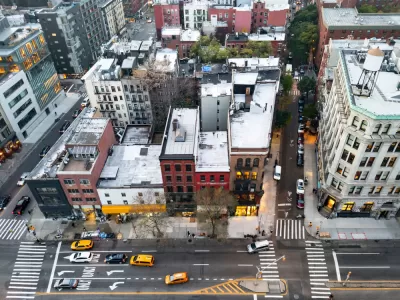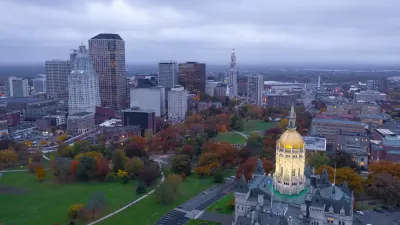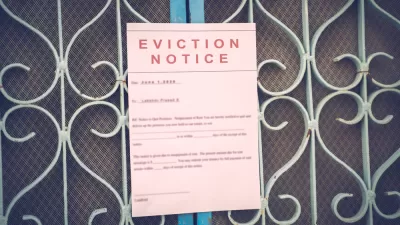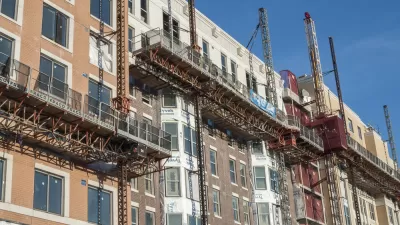New housing tools in New York City demystify building ownership information and identify problematic landlord behavior. What would it take to replicate them?

When I type my Brooklyn address into New York City’s property owner search tool, the first result I see is an error message that says no records exist for my building. After several tries—substituting "street" for "st.," then deleting it altogether, then removing the apartment number—it finally returns an actual result: an anonymous LLC, with no other clarifying information.
A different website gives me a more helpful result on my first try: my landlord’s full name, familiar from the dozens of rent checks I’ve written him over the years. I can also see how many evictions have been recorded at the property (zero), how many open violations the building has with the city’s Department of Housing Preservation and Development (one, for a faulty lock), and a list of other buildings my landlord owns nearby.
That second site is Who Owns What, one of several digital tools created by tech nonprofit JustFix.nyc to empower the city’s renters. Enter the address of a New York City residential building into the Who Owns What search bar and you’ll get clear ownership information and other useful data points, more readily than you’d be able to pull that information from a city or state-run web portal.
Shielding identities behind LLCs is a common practice for landlords in cities across the country, including in New York City, where one building alone in south Williamsburg notoriously serves as the registered address and rent-check-pickup-point for hundreds of anonymous property owners. Having a tool that demystifies building ownership information can help renters take their landlords to court or organize with tenants in other buildings. It also helps policymakers and housing advocates connect the dots of problematic landlord behavior, spotting patterns of harassment and neglect, questionable eviction practices, or over-leveraged property owners across the city.
"Making those connections between buildings has historically been really difficult," says Georges Clement, co-founder and executive director of JustFix.nyc. "Most people will pay rent to 110th Street LLC, rather than the true owner of the building. We try to unmask those owners behind the LLCs and make connections to map out the true ownership portfolios across New York City."
The algorithm that allows JustFix to do so draws registration data from the city Department of Housing Preservation and Development (HPD) in real time to search roughly 170,000 residential buildings for registered owner information. When the tool runs into an anonymous LLC, it gathers "head officer," "individual owner," or "corporate owner" contact information for that LLC (data that is also hosted by HPD), then searches through other HPD records for any additional properties associated with that owner.
For tenants, housing organizers, legal advocates, and reporters, the user-friendly simplicity of Who Owns What makes it a remarkable tool, and far more convenient than sifting through the aforementioned city records.
Of course, these tools are location-specific, reliant on public data available in New York City. Could tech savvy groups outside of New York City replicate JustFix’s success, building similar products to address housing issues in their communities? Here’s how the tools in New York City came to be.
Helping Tenants Build Cases
JustFix got its start ....
FULL STORY: How Hidden Property Owners and Bad Landlord Patterns Are Revealed in NYC

Planetizen Federal Action Tracker
A weekly monitor of how Trump’s orders and actions are impacting planners and planning in America.

San Francisco's School District Spent $105M To Build Affordable Housing for Teachers — And That's Just the Beginning
SFUSD joins a growing list of school districts using their land holdings to address housing affordability challenges faced by their own employees.

The Tiny, Adorable $7,000 Car Turning Japan Onto EVs
The single seat Mibot charges from a regular plug as quickly as an iPad, and is about half the price of an average EV.

Seattle's Plan for Adopting Driverless Cars
Equity, safety, accessibility and affordability are front of mind as the city prepares for robotaxis and other autonomous vehicles.

As Trump Phases Out FEMA, Is It Time to Flee the Floodplains?
With less federal funding available for disaster relief efforts, the need to relocate at-risk communities is more urgent than ever.

With Protected Lanes, 460% More People Commute by Bike
For those needing more ammo, more data proving what we already knew is here.
Urban Design for Planners 1: Software Tools
This six-course series explores essential urban design concepts using open source software and equips planners with the tools they need to participate fully in the urban design process.
Planning for Universal Design
Learn the tools for implementing Universal Design in planning regulations.
Smith Gee Studio
City of Charlotte
City of Camden Redevelopment Agency
City of Astoria
Transportation Research & Education Center (TREC) at Portland State University
US High Speed Rail Association
City of Camden Redevelopment Agency
Municipality of Princeton (NJ)





























